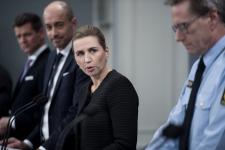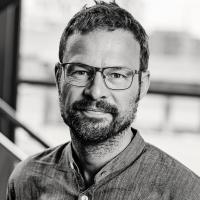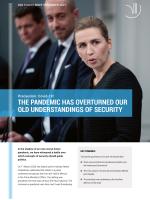The pandemic has overturned our old understandings of security

On 11 March 2020, the Danish prime minister, Mette Frederiksen, addressed the nation in a press conference broadcast live from the ’Hall of Mirrors’ in the Prime Minister’s Office. The setting was grandiose, the tone was serious, the future gloomy. The coronavirus pandemic was here, and it was threatening Danish citizens, the healthcare system and the welfare state. Frederiksen announced an immediate two-week lockdown of Denmark. Now was the time to show ‘community spirit.’ Every citizen was called upon to work collectively to protect vulnerable individuals, societal cohesion and the survival of the Danish state. Gone were the threats of climate change, which dominated the general election less than a year earlier. If border control was relevant, the reason was no longer the migrants and refugees whose ‘influx’ and ‘failure to integrate’ had fundamentally re-configured the Danish party system over the last decades.
The Danish governance of Covid-19 showed that:
- There was a political and professional battle overthe meaning of ‘precaution’.
- The ‘risk cultures’ of Denmark and Sweden differed and clashed.
- The individual was mobilised as the frontline defence of the state.
Some would argue that this was a classic act of securitization requiring the concentration of all attention and resources on emergency measures to fight off an existential threat. However, what happened was much more complicated. What we saw was a complex web of translations of this security message into the daily practices of government agencies, private companies and citizens.
Three battles over authority
The prime minister´s announcement of the lockdown is illustrative of a much wider process which has been underway for some time. ‘Security’ has simultaneously come to assume a new centrality in public and private policymaking, while it increasingly takes many different forms. There is no longer just one specific security mode of addressing unwanted futures but instead several competing modes of practice. The Covid-19 pandemic thrust this development to the foreground.
After the first press conference, new concepts grew and policies were born; each designed to prevent the emergence of an unwanted future. By slicing this up into three zones of struggle over the meaning of security (‘translation zones’), the following analysis will show how the debate on Covid-19 paved the way for new meanings and practices of security.
Professions negotiating precaution
‘… the authorities’ recommendation is that we shut down all unnecessary activity for a period of time. We apply the precautionary principle.’
With those words, the prime minster of Denmark closed the country. Precaution, which is ultimately a response to a lack of certain scientific knowledge, became the main political argument for the Danish lockdown.
This policy was, however, not based on a consensus: government ministers used societal security to frame the need for precautionary action, while health authorities stuck to the scientific certainty and known risk levels and recommended softer steps. In just a few days, a battle arose over how sure about the future the authorities needed to be – between calculable risk and precaution in the face of uncertainty. The consequence was a new epidemic law, which took the decision-making power over the fight against epidemics away from the National Board of Health.
There is no longer just one specific security mode of addressing unwanted futures – and then more and more of that one practice – but several competing styles and codifications.
Later in April 2021, the Danish vaccine program gave rise to a new battle over principles of government. Here, however, the positions were reversed when Søren Brostrøm, director of the National Board of Health, argued for a precautionary approach toward the vaccines from AstraZeneca and Johnson & Johnson. This time, the prime minister openly criticised the decision, and the leader of the opposition assented
by saying ‘I simply do not understand that decision.’ The chairman of the Danish Chamber of Commerce argued that the politicians should ‘take power from Brostrøm’ because cancelling vaccines would have ‘huge financial consequences’ and lead to many new infections and hospitalisations. For the health authorities, however, security and safety were the main reasons for excluding the two vaccines: ‘public trust’ in the vaccine program was more important to Danish citizens than the so-called ‘actual’ risks involved in taking the vaccine.
These two episodes amount to a battle of professional logics. The concept of ‘precaution’ paved the way for a security logic arguing that ’when science is not enough, security politics must dominate.’ It is, however, not a given when this precautionary logic of security kicks in. This is only decided in a struggle over the definition of a good life and the relative weight of ‘unwanted futures.’
Risk cultures: negotiating trust and responsibility
The concept of precaution also came to play a huge role when filtered through the respective ‘risk cultures’ in Sweden and Denmark. In Denmark, a strict set of rules regulating all of society was imposed based on a precautionary and risk-averse approach. In Sweden, policies were decided based on medical risk, calculated exclusively by the health authorities. This approach was not questioned by the political establishment.
These differing risk cultures displayed a deep gulf between Denmark and Sweden, two seemingly similar neighbour states. Sweden embraced a clear functional separation between health and security politics, and a high degree of trust in domain-specific experts and in the population to perform self-control. Denmark, on the other hand, accepted the prime minister’s prerogative in governing the country in all its facets as well as the underlying distrust in the ability of the population to self-police during times of crisis. The result was two opposite approaches to handling the pandemic, based on different evaluations of risk and precaution.
In Sweden, schools and stores remained open, and people were allowed to travel. The local municipalities and schools could decide for themselves how to best act in the global pandemic. Trust and responsibility were central concepts in this approach.
Denmark opted for border closure without scientific evidence of its effect. Restaurants and stores were closed, and school children sent home. People were instructed to see as few people as possible.
Negotiating the role of individuals in the provision of security
In effect, individual citizens were called upon to act as the frontline defence against coronavirus in Denmark. With the pandemic high on the political agenda, security became an integral part of everyday life, blurring the boundary between the state and the individual, the public and the private.
In Denmark, the responsibility for providing security is usually assigned to the state. During the pandemic, it took on a new dimension as the security of the country became a matter also for the individual to handle. Based on several decrees from government authorities, people were asked to wear masks and evaluate the colour of a child’s runny nose in order to judge the level of danger (was this Covid-19 or ‘just a cold’?).
One key example that confronted our conventional separation of private versus public decisions and responsibilities happened when the vaccine program for children was introduced in June 2021. Even before the vaccine was officially approved, parents were asked to sign their children up for vaccination, not primarily for their own health but to avoid an unwanted future of more Danish deaths. The chairman of the Danish Paediatric Society called for a precautionary approach to the possible side-effects: ‘We also allow ourselves to question whether it is at all necessary to vaccinate this part of the population. For the conclusion has emerged based on some theoretical calculations associated with very great uncertainty.’
With the coronavirus pandemic high on the political agenda, security has become an integral part of everyday life, blurring the boundary between the state and the individual, the public and the private.
The health authorities also used precaution as the main argument, but instead of having the child as the main referent object, they had society: ‘By also vaccinating the children, we can keep control of the epidemic and protect the vulnerable,’ the vice director of the National Board of Health argued. The decision on what kind of precaution to deploy was for the individual parents to make: to protect their child and/or society.
Security is not (just) what it used to be
These three negotiations of unwanted futures concerning professions, risk cultures and state/individual responsibilities in the Covid-19 pandemic illustrate a broader point: security is not what it used to be. Nor is any one authority in control of its new meanings. Different dangers are no longer predictably handled by pre-assigned experts; they always move across many domains. We must equip ourselves with tools to understand how security is constantly translated across professions, national cultures and scales, in order to understand how new practices of steering suddenly becomes possible.
This brief is based on the book Translations of Security: A Framework for the Study of Unwanted Futures.
DIIS Eksperter


